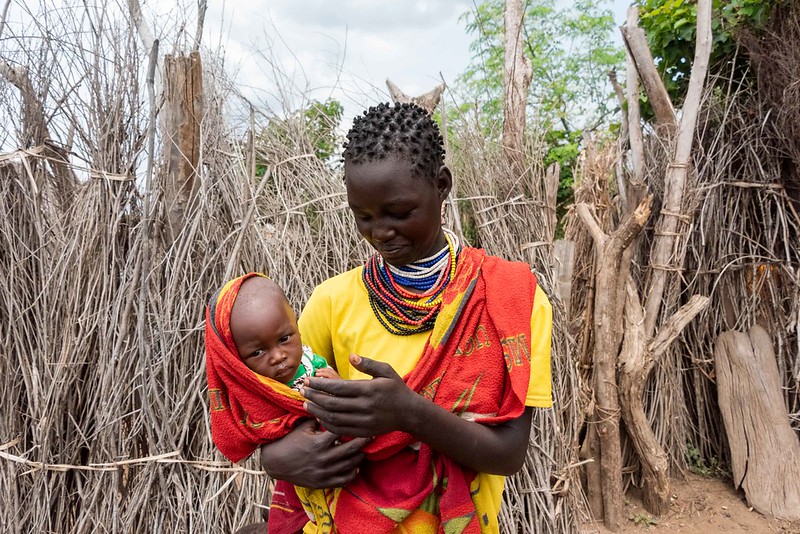USAID and Maternal Mortality in Ethiopia
 Across the developing world, the health of mothers and the risks of childbirth remain a difficult challenge. Developing nations experience a lack of modern health care centers, inaccessible medical training, diseases that the developed world has eradicated and food insecurity, among other hindrances to healthy pregnancies and deliveries. Despite recent improvements, Ethiopia continues to experience these difficulties. It is for this reason that the United States Agency for International Development (USAID) has built up various programs that work to improve the health of mothers and reduce maternal mortality in Ethiopia.
Across the developing world, the health of mothers and the risks of childbirth remain a difficult challenge. Developing nations experience a lack of modern health care centers, inaccessible medical training, diseases that the developed world has eradicated and food insecurity, among other hindrances to healthy pregnancies and deliveries. Despite recent improvements, Ethiopia continues to experience these difficulties. It is for this reason that the United States Agency for International Development (USAID) has built up various programs that work to improve the health of mothers and reduce maternal mortality in Ethiopia.
The Situation
In the last 20 years, the number of mothers who die from childbirth in Ethiopia has dropped from 29,600 mothers in 2002 to about 10,000 in 2020. Likewise, maternal mortality measures such as the maternal mortality ratio (number of mothers who die from pregnancy-related causes per 100,000 live births) have more than halved in the last two decades. Currently, there are 401 deaths per 100,000 live births in Ethiopia. Despite these levels remaining high in comparison with developed nations, which experience just 24 deaths per 100,000 live births, these improvements are extremely significant. In addition to the work of the Ethiopian government and other NGOs and nonprofits working across the country, USAID has made major contributions to improve maternal mortality in Ethiopia.
Health Care Worker Program
An aspect of the discussion surrounding maternal mortality in Ethiopia is the state of health care across the country. Currently, there is a global median of 48.6 health care workers per 10,000 people. Ethiopia only has 9.2 workers per 10,000 people. These numbers indicate a stark shortage of health care workers, which has serious implications for expectant mothers and birthing women. When there are so few health care workers, it is impossible to ensure that pregnant people receive antenatal care, access a sterile birthing facility or receive quality health care during and after labor.
In response to the ongoing situation, USAID has built up two programs in Ethiopia, known as USAID’s Transform Primary Health Care and Transform Health in Developing Regions projects. These projects focus on underserved areas of Ethiopia to expand basic health care needs, strengthen the abilities of health care workers and provide support for health care programs through planning, budgeting and managing. This program is a major source of aid in rural parts of the country, where women experiencing pregnancy and childbirth are at an increased risk of maternal mortality.
Preventable Disease Programs
Another important aspect of maternal health is infant and child health. Currently, 24% of all preventable deaths in Ethiopia are women and children. It is for this reason that USAID intervenes in Ethiopia with various vaccination and nutrition programs for both mothers and children. In 2023, USAID reached three million to provide mosquito nets, 62% of births measured received DTP3 immunizations before age 1 and nearly 700,000 women gave birth in a sterile U.S.-funded facility. USAID also funds the Core Group Polio Project to improve vaccination (namely in rural areas), provide outbreak response and eventually eradicate polio from Ethiopia. These programs do the vital work of avoiding preventable deaths in not only mothers across Ethiopia but also their young children.
Nutrition Program
A key aspect of both maternal and child health is nutrition. Nutrition is an extremely difficult obstacle to overcome in a country like Ethiopia, where droughts, conflict and extreme poverty are constant challenges. For this reason, USAID works through its Feed the Future Growth through Nutrition Program to boost the nutrition of pregnant women, mothers, infants and young children. This program focuses on education programs that ensure good nutrition via nutrient and vitamin-rich foods are household staples. With only 11% of the USAID budget for maternal health in Ethiopia, this program reached 6.1 million children under 5 in 2023 alone. Despite difficulties in ensuring good nutrition which impacts the health of mothers and children, USAID has put in important work to improve the health of mothers and therefore lower maternal mortality in Ethiopia.
Looking Ahead
Maternal mortality remains a critical challenge in the developing world and Ethiopia is no exception. However, organizations like USAID are making significant strides in creating a safer environment for mothers. Their efforts are crucial in improving health care, reducing preventable diseases and enhancing nutrition.
– Carlie Duggan
Carlie is based in Newtown, PA, USA and focuses on Global Health for The Borgen Project.
Photo: Flickr
